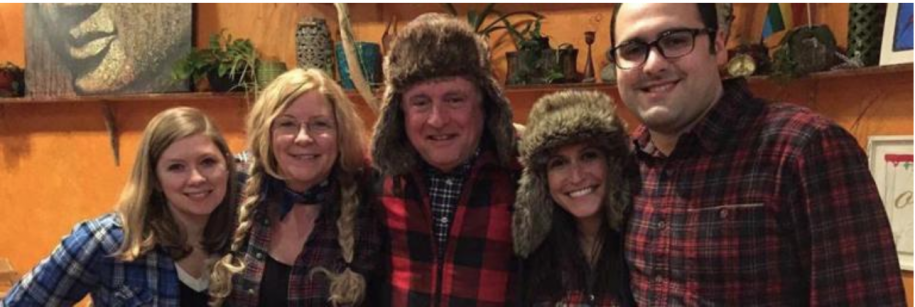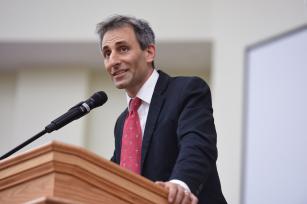
Breadcrumb
- Essential Partners
- Our Impact
- News and Notes
- Dads on Dialogue
Dads on Dialogue

As we approach Father's Day, we're reminded that dialogue starts around our own dinner tables. Though we speak of it in terms of helping people understand and humanize "the other," it's sometimes not about the reconciliation of strangers - but about the mysteries of communicating with those closest to us. It's a way of life, and it starts at home. To that end, we asked our three resident dads four questions about how dialogue has informed their parenting, and being a dad has informed how they practice dialogue.
How has being a father informed your practice as a facilitator?
What techniques in dialogue have informed your parenting?
What are you most proud to have inherited from your own father, personally or professionally?
What do you most hope to pass on to your children in communicating across difference?
Bob Stains
How has being a father informed your practice as a facilitator?
One of the great gifts of children is their curiosity. They’re thirsty to know; they pay attention to the finest details of a walk or a book or what you’re cooking. I learned a great deal about paying attention from being party to their great curiosity and focus. This has helped me to follow communication patterns, notice peoples’ feelings and reactions and to be sensitive to the effects of the physical environment. I also learned about the effects that words can have to harm or to heal; how much damage I could do by flying off the handle, or how much joy I could evoke with thoughtful speaking. I still have a lot of growing to do on this front (I still too often speak first and think later) but because of being a dad, I’m much more aware of the effects that I can have than I had been before having children.
What techniques in dialogue have informed your parenting?
That’s an easy and a hard question to answer. I am very aware of being a better parent because of my PCP work, but I can’t boil it down to one or more techniques. It’s more about walking a path; continuously cultivating a mindset or a stance of being genuinely interested in the experiences, emotions, perspectives and thinking of my family members. And trying –as we would say at PCP- to speak to be understood; to listen to understand. I have a very long way to go. I expect I will never reach the end of the path but I’m glad to be on it.
What are you most proud to have inherited from your own father?
So much! My dad was creative, curious and adventurous; playful and brilliant. His genuine interest in doing things with my sister and me affected me deeply; showed me how a father could be connected to his children. It was not uncommon for him to say, “let’s do art!” and have us in the kitchen in his old shirts, painting or drawing or creating huge messes while making pictures of matadors with glue, clothesline and colored aquarium gravel. Or writing sci-fi stories together after watching episodes of The Twilight Zone. Dad was also courageous (I don’t think I inherited that trait): he raised my sister and me by himself in the 1950s and 60s, fighting attempts of family and the system to remove us from his care after our mother died. I do think I inherited a certain ferocity or “warrior energy” from him when it comes to protecting and defending my family. Dad was also a connector of people and a breaker of barriers. In the days when fraternities in my home town of Buffalo, NY would not admit Jewish men, he took it upon himself to break that barrier in his fraternity, then in others across the city. He also had gay friends whose relationships he supported in the 1950s and 60s and encouraged us to respect their relationships as we would straight couples. I think much of my passion for inclusion comes from his example. Lastly and most importantly Dad was a lover. We knew that he loved us and our mother with all his heart and soul. His love lives with me even now. I hope I have embodied some of his example at home with my family.
What do you most hope to pass on to your children in communicating across difference?
I think whatever was going to be passed on has been. My children are all in their mid-twenties now, and all are deeply concerned with inclusion, diversity, and social justice. They are interested in and probably more facile with communicating across differences than I am. Some of that probably comes from my example; most from their own hearts. What remains for them –and all of us- is to respect difference wherever it is. We often think of it as “out there” in an encounter with some “other.” But it’s right in front of us every day: across the dinner table, on a date, relaxing or working together, or even in the mirror. We are in many ways mysteries to each other no matter how close we are. We will never come to the end of discovering one another, or ourselves.
Dave Joseph
How has being a father informed your practice as a facilitator?
Being a father has been an ongoing opportunity to cultivate a sense of humility, to recognize my own limitations. This applies both with respect to acknowledging what I have no control over, as well as to falling short being the kind of father I would hope to be. Similarly, I’ve learned over time to let myself off the hook, when I haven’t known how to deal perfectly with facilitation challenges.
Conversely, what techniques in dialogue have informed your parenting?
Recognition of the existence of multiple narratives and perspectives has helped me as a father and has also been something that I have tried to pass along to my sons. I try to maintain a sense of curiosity and to ask genuine questions when I hear one of them espouse a point of view that is so significantly different from my own (and they are no longer teenagers!).
What are you most proud to have inherited from your own father, personally or professionally?
My dad, a retired principal, consistently meets the most wonderful people in the world. Whether it’s a friend, colleague or a caregiver (now that he’s 93), he encounters the warmest, friendliest, most positive people…..because of his remarkable disposition, positive energy and commitment to seeing the best in others. He is an amazing role model who consistently acts on that assumption and is still contacted on his birthday by former teachers of 30 + years ago.
What do you most hope to pass on to your children in communicating across difference?
My greatest hope is that they will recognize the tremendous value of curiosity and genuine interest in understanding the other person’s point of view - in personal, as well as professional relationships. All too often, disagreements occur when people do not have a shared understanding of the meaning (for each other) of what’s being debated. This can lead to needless frustration, as well as damaging trust and relationships.
John Sarrouf
How has being a father informed your practice as a facilitator?
My children constantly defy my expectations – they are their own people. Having to come to terms with the fact that I cannot control these beautiful creatures I have helped create has instilled a humbleness and humility about what is within my power, my responsibility. As a facilitator I can only do so much to set up the possibility for a group, but they are the experts of their context, they know best where they want it to go – they must do the work to get there, bear the responsibility of listening, speaking, and connecting. Like with my children, I am mostly a witness to their flourishing.
Conversely, what techniques in dialogue have informed your parenting?
I have totally changed the way I ask questions of my children. I remember with my nephews and nieces asking nothing but “yes or no” questions I already knew the answers to. Or the obligatory “how’s school going?” Which received the obligatory “pretty good.” Killers to conversation and totally limiting of the possibilities. I still have to catch myself when I begin to say things like “was it great or did you hate it?” as if those were the only choices. Now I ask “tell me a story about something that excited you at school today?” Or, “Tell me one thing you absolutely love about that book and one thing you are still thinking about.” The most powerful thing I feel I can do as a parent is invite my kids to share themselves. The quality of the question makes all the difference in that invitation.
What are you most proud to have inherited from your own father, personally or professionally?
One of the hardest things to teach about facilitating or mediating is to become comfortable with silence. Not every moment needs to be filled with speaking. With silence comes time to reflect, time to choose words that are closest to our meaning, to make space for others to contribute. I remember my father always saying there is nothing more powerful than the pregnant pause – it is a moment of infinite possibility. My comfort with silence is one of my father’s greatest gifts to me.
What do you most hope to pass on to your children in communicating across difference?
Curiosity. I just got back from a conference where the keynote speaker, philosopher Richard Kearney, talked about “welcoming the stranger.” I think that approaching the world with curiosity - meeting difference with inquiry - is part of that welcome. There is nothing more welcoming than the invitation of a genuinely curious question asked out of respect and a desire to understand and connect. I want my kids to feel comfortable in the place of not knowing, of being willing to learn from everything and everybody they meet.
